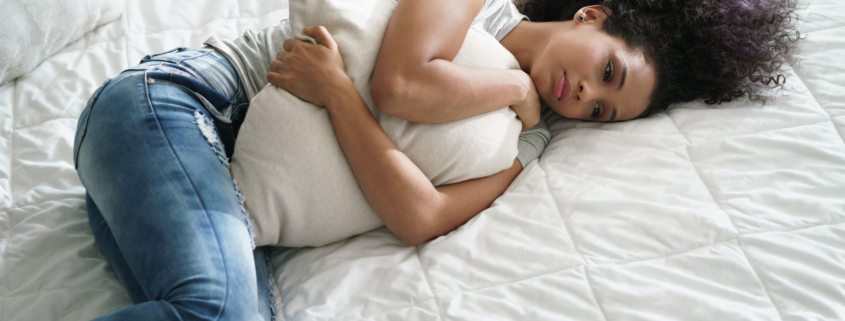Unable to Get Out of Bed Due to Depression
Table of Contents
Fatigue, sleep problems, and feelings of despair are common symptoms of depression. Suffering from depression can cause you to lose interest in your usual daily activities and find you have zero motivation. Sometimes you even feel unable to get out of bed due to depression symptoms. If this sounds familiar to you, please read on for some valuable tips for dealing with depression.
What is Depression?
Depression is the second most prevalent mental health disorder in the U.S., with the NIMH reporting that 21 million people are afflicted with the mood disorder. This represents 8.3% of the population. Depression rates are nearly double in women (10.5%) versus men (6.2).
Young adults aged 18-25 experience the highest rates of depression, with 18.6% of them affected by this serious disorder. This statistic is especially troubling in light of the increasing rates of suicide in this age cohort.
There are different types of depressive disorder, including:
- Major Depressive Disorder
- Persistent Depressive Disorder
- Postpartum Depression.
- Seasonal Affective Disorder
- Premenstrual Dysphoric Disorder
- Bipolar Depression
Symptoms of Major Depressive Disorder
When seeking help for depression, the first step is to have a physical exam. This is important for ruling out a medical issue or medication side effect for causing the symptoms.
If no health issue is detected, a mental health professional can evaluate the person for a possible depressive disorder. The DSM-5 outlines the diagnostic criteria for major depressive disorder as such:
- Depressed mood most of the day, nearly every day, as indicated by either subjective report or observation made by others
- Markedly diminished interest or pleasure in all, or almost all, activities more of the day, nearly every day
- Significant weight loss when not dieting or weight gain, or decrease or increase in appetite nearly every day
- Insomnia or hypersomnia nearly every day
- Psychomotor agitation or retardation nearly every day
- Fatigue or loss of energy nearly every day
- Feelings of worthlessness or excessive or inappropriate guilt nearly every day
- Diminished ability to think or concentrate, or indecisiveness, nearly every day
- Recurrent thoughts of death, recurrent suicidal ideation without a specific plan, or a suicide attempt or a specific plan for committing suicide
A diagnosis of depression is based on the number of symptoms present.
Too Depressed to Get Out of Bed
When someone is in the grip of depression, they typically feel very tired. Intense fatigue combined with insomnia can make the person feel unable to get out of bed due to depression. Individuals with depression often struggle with malaise or apathy, which only intensifies the challenge to get up and be productive.
Depression may make it hard to concentrate or remember things, which can make it difficult to stay focused on the job. Mostly, the common feelings of hopelessness, sadness, or despair may cause a loss of interest in life. Staying safely in bed can seem like the best decision for someone struggling with depression.
5 Tips to Help You Get Out of Bed When You Feel Depressed
Someone who feels unable to get out of bed due to depression may find that some small life hacks can help them get going in the morning. Consider these 5 tips:
- Set small goals. Instead of becoming overwhelmed with the full list of tasks you are expected to handle that day, start small. Set one small goal for your day that you believe you can accomplish.
- Get inspired. Download smartphone apps that feature positive affirmation meditations that can inspire you to get up and start the day.
- Enlist support. If you live with a roommate, spouse, or partner, ask them to keep you accountable about encouraging you to get out of bed.
- Have something to look forward to. Keep a notepad on your nightstand and each night before bed, jot down one positive thing to look forward to the next day.
- Get a dog. Dogs by nature are both loving and needy. Having a loving dog can lift your spirits, and it will also require you to get out of bed. They need to be let out first thing in the morning and then fed.
Treatment Options for Depression
If none of the above offer improvement and you still can’t get out of bed due to depression, seek help. If your doctor has ruled out a health problem causing the symptoms, seeing a therapist is the next actionable step.
A psychiatrist can evaluate the depression and create a treatment plan that involves both medication and therapy. This is standard outpatient treatment that is often sufficient for helping someone manage depression symptoms.
There are two higher levels of outpatient treatment for mental health disorders: intensive outpatient program and day programs. The IOP involves about nine hours of treatment, and day programs involve about twenty-five hours of treatment per week.
The highest level of care for depression is found at a residential treatment program . These programs provide 24-hour support and monitoring for individuals with more severe or persistent depression.
Residential Depression Treatment for Persistent or Worsening Depression
The residential treatment option offers a unique opportunity to exit from your daily obligations and focus entirely on your mental health. You will reside at the treatment center, which is typically a private estate with a small number of beds. This provides a more personalized and tailored form of treatment for depression.
Treatment elements include:
- Intake and evaluation
- Individual psychotherapy
- Group therapy
- Medication management
- Holistic therapies
- Nutrition and exercise
- Case management
The duration of your stay in residential treatment depends on the severity of your depressive disorder. The case manager arranges for any step-down treatments or therapies after you complete residential treatment.
Robles Ranch Mental Health Residential Treatment for Depression
Robles Ranch Mental Health offers residential care for individuals struggling with depression. If you are unable to get out of bed due to depression, our compassionate and highly skilled clinicians can help you. Please reach out to us today at (866) 840-3841.




